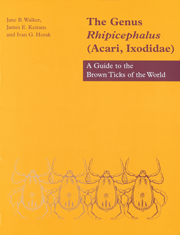Book contents
- Frontmatter
- Contents
- Acknowledgements
- 1 Introduction
- 2 Relationships of the ticks (Ixodida) and definition of the genus Rhipicephalus
- 3 Format for the accounts of individual species
- 4 Glossary
- 5 Rhipicephalus species names of the world
- 6 Rhipicephalus species occurring in the Afrotropical region
- 7 Accounts of individual species occurring in the Afrotropical region. pages 59 to 277
- Accounts of individual species occurring in the Afrotropical region. pages 278 to 490
- 8 Host/parasite list for the Afrotropical Rhipicephalus species
- 9 Rhipicephalus species occurring outside the Afrotropical region
- 10 Accounts of individual species occurring outside the Afrotropical region
- 11 Host/parasite list for the non-Afrotropical Rhipicephalus species
- 12 Species groups based on the immature stages
- 13 The transmission of tick-borne diseases of animals and humans by Rhipicephalus species
- Index
8 - Host/parasite list for the Afrotropical Rhipicephalus species
Published online by Cambridge University Press: 05 November 2011
- Frontmatter
- Contents
- Acknowledgements
- 1 Introduction
- 2 Relationships of the ticks (Ixodida) and definition of the genus Rhipicephalus
- 3 Format for the accounts of individual species
- 4 Glossary
- 5 Rhipicephalus species names of the world
- 6 Rhipicephalus species occurring in the Afrotropical region
- 7 Accounts of individual species occurring in the Afrotropical region. pages 59 to 277
- Accounts of individual species occurring in the Afrotropical region. pages 278 to 490
- 8 Host/parasite list for the Afrotropical Rhipicephalus species
- 9 Rhipicephalus species occurring outside the Afrotropical region
- 10 Accounts of individual species occurring outside the Afrotropical region
- 11 Host/parasite list for the non-Afrotropical Rhipicephalus species
- 12 Species groups based on the immature stages
- 13 The transmission of tick-borne diseases of animals and humans by Rhipicephalus species
- Index
Summary
Unless otherwise stated the records in the host/parasite checklist refer to adult ticks. The number in brackets appearing after a tick's name represents the number of collections made from the host species under which it is listed. It has been difficult to determine the exact number of records for R. fulvus. Consequently where the name of this tick appears in the host/parasite list it is followed by (+) which indicates that it has been collected from a particular host species.
When a tick's name appears in bold type this indicates that the animal under which it is listed is a preferred host of the adults. However, when the hosts of the immature stages are entirely unrelated to those of the adults the names of these ticks also appear in bold type under the names of the preferred hosts of their immature stages. These ticks are R. follis, R. gertrudae and R. simus. When more collections of their immature stages have been made we feel sure that the same will apply for R. compositus, R. lounsburyi, R. lunulatuSy R. muhsamae, R. neumanni, R. planus, R. praetextatus, R. senegalensis and R. zumpti and perhaps other species too.
Despite the fact that the immature stages of R. pravus, R. sp. near pravus and R. warburtoni are found on hares, on which their adults also occur, they undoubtedly have a preference for elephant shrews. The names of these ticks are also typed in bold under their respective elephant shrew hosts. We are confident that the same will apply for R. punctatus and R. sp. near punctatus once additional collections of their immature stages have been made.
- Type
- Chapter
- Information
- The Genus Rhipicephalus (Acari, Ixodidae)A Guide to the Brown Ticks of the World, pp. 491 - 518Publisher: Cambridge University PressPrint publication year: 2000



